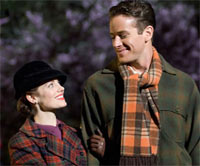 It would be a Herculean task to try to encompass the entire career of the world’s most famous evangelist, Billy Graham, so when producers as well as director Robby Benson (yes, “Ice Castles” Robby Benson) decided to do a biopic, they very wisely decided to focus on Graham’s transformation from Tennessee farm boy to the beginning of his rise to international preacher to the masses. It is, in fact, most likely this period of time is the part of Graham’s life that Christians probably know the least about, and mainstream society probably even less. So, in that sense, “Billy: The Early Years”, which opens Friday, is an insightful glimpse into the man behind the legend. While the movie is an unabashed love letter to both Billy and his wife Ruth, the movie is neither too precious in its treatment of Graham’s accomplishments nor is it too heavy-handed in it’s recalling of most events. It also introduces audiences to a young man who is probably going to go on to be a major movie star–Armie Hammer, who plays Graham.
It would be a Herculean task to try to encompass the entire career of the world’s most famous evangelist, Billy Graham, so when producers as well as director Robby Benson (yes, “Ice Castles” Robby Benson) decided to do a biopic, they very wisely decided to focus on Graham’s transformation from Tennessee farm boy to the beginning of his rise to international preacher to the masses. It is, in fact, most likely this period of time is the part of Graham’s life that Christians probably know the least about, and mainstream society probably even less. So, in that sense, “Billy: The Early Years”, which opens Friday, is an insightful glimpse into the man behind the legend. While the movie is an unabashed love letter to both Billy and his wife Ruth, the movie is neither too precious in its treatment of Graham’s accomplishments nor is it too heavy-handed in it’s recalling of most events. It also introduces audiences to a young man who is probably going to go on to be a major movie star–Armie Hammer, who plays Graham.
“Billy” begins with an elderly man who we learn is former evangelist Charles Templeton lying on his death bed, giving his final interview. During the interview, he begins to tell the story of what he knows of Billy Graham’s early years.
The flashbacks begin with Graham as a teen searching for purpose, when he reluctantly attends a tent revival meeting. The outcome of that meeting is Graham feeling the beginning of a call on his life to go into ministry. He heads off to Bob Jones College, but after a disagreement with Bob Jones himself, Graham then transfers to another Bible college in Florida. He is not the best or the brightest there, either, and most friends and professors seem to believe he will become nothing more than a small town preacher. Of course, we all know this is anything but true, but the movie focuses on the journey he and wife Ruth take in getting into full-time, nationwide evangelism and the conflicts along the way.
While the movie tries a little bit too hard in places to be funny and it maybe hits a little too feverishly on the theme of Graham not becoming “the chosen one” not due to talent but due to sincerity, for the most part this movie’s straightforward earnestness is an asset, not a hindrance. It simply doesn’t try to be anything more or less than what it is–a biopic that does delve too deeply into any one aspect of Graham’s life, but does a respectable job of hitting the important points.
Where the movie is at its strongest is in capturing the deep abiding love Billy and Ruth have for each other. They were each other’s equals in mind and spirit, as well as equally committed to sharing the gospel. Certainly Armie Hammer’s charismatic and dead-on depiction helps bring authenticity to this love story, as does the delightfully vivacious performance by Stefanie Butler as Ruth.
Of equal interest is the other main relationship of the movie–between Charles Templeton and Graham. While Templeton originally starts out as something of a mentor to Graham, in a post-World War II society, he begins to have a crisis of faith and never recovers from it. It’s a bit of Graham’s history I certainly didn’t know much about and would have like to have learned more.
This is a film that will certainly play well in the heartland, but I think what will be more interesting is whether the movie will be successful enough to play on the coasts, and whether less conservative religious communities will be willing to give the movie a chance. I certainly hope so, as it could alter pre-conceptions of Graham, as well as spark some interesting conversations about the choices we make when wrestling with spiritual questions of faith and doubt.

